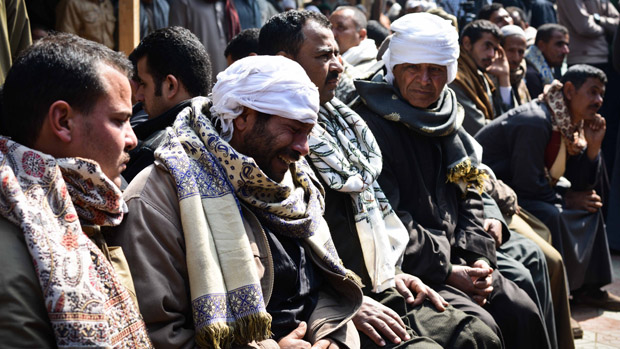Egypt's Coptic Christians: Who are they and what do they believe?
Islamic State claims responsibility after Palm Sunday attacks kill at least 47 worshippers

A free daily email with the biggest news stories of the day – and the best features from TheWeek.com
You are now subscribed
Your newsletter sign-up was successful
Two separate attacks on Coptic Christian churches in Egypt killed dozens of worshippers and left scores more injured as they marked Palm Sunday yesterday.
Islamic State has claimed responsibility for the twin suicide bombings in Alexandria and the Nile Delta city of Tanta, in which at least 47 people were killed.
The attacks come just weeks before a planned visit by Pope Francis.
The Week
Escape your echo chamber. Get the facts behind the news, plus analysis from multiple perspectives.

Sign up for The Week's Free Newsletters
From our morning news briefing to a weekly Good News Newsletter, get the best of The Week delivered directly to your inbox.
From our morning news briefing to a weekly Good News Newsletter, get the best of The Week delivered directly to your inbox.
"The pontiff will find himself arriving in a country where the government is struggling to protect Christians and where the Islamic State is intent on driving a wedge between the two communities," the New York Times reports.
Coptic Christians in the country are "furious at a state they believe will no longer protect them from neighbors bent on their murder," said Reuters.
Egyptian Christians have long been faced violence at the hands of Islamist militants and are also routinely sidelined by authorities in the Muslim-majority state.
Who are they?
A free daily email with the biggest news stories of the day – and the best features from TheWeek.com
Around 90 per cent of Egypt's 80-million population is said to be Muslim, while the remaining ten per cent is believed to be Christian, with the majority belonging to the Coptic Orthodox Church.
The highest percentage of Christians live in southern Egypt and some sections of Cairo and Alexandria, according to an International Religious Freedom Report from the US.
"The Coptic Orthodox Church is one of the most ancient Churches in the world, founded in the first century in Egypt by Saint Mark the Apostle," said the UK's Coptic Centre.
The church is led by Pope Tawadros II, who was in the Alexandria church at the time of the attack, but escaped uninjured, local officials confirmed.
In accordance with religious tradition, the pope is chosen by a blind-folded altar boy who selects his name from a chalice.
Prayer and fasting are central to the Coptic faith, with more than half the year set aside for fasting."These periods are considered to be times of spiritual growth and reflection based on prayer and Scripture," says the Coptic Center.
Why does the group face persecution?
Christians have been targeted by IS ever since it began taking over huge swathes of Syria and Iraq. The militants have previously claimed that attacks against Coptics are revenge for "Muslim women persecuted by Coptic crusaders in Egypt".
The minority group accuses the Egyptian authorities of doing little to protect Coptic churches and schools, as well as excluding its members from key roles in society.
"Poorly represented in government, Copts complain that they are sidelined from many posts in the justice system, universities and the police," said AFP.
Authorities also often refuse to issue building permits for churches, arguing it would "disturb the peace" with their Muslim neighbours, the agency adds.
-
 How Democrats are turning DOJ lemons into partisan lemonade
How Democrats are turning DOJ lemons into partisan lemonadeTODAY’S BIG QUESTION As the Trump administration continues to try — and fail — at indicting its political enemies, Democratic lawmakers have begun seizing the moment for themselves
-
 ICE’s new targets post-Minnesota retreat
ICE’s new targets post-Minnesota retreatIn the Spotlight Several cities are reportedly on ICE’s list for immigration crackdowns
-
 ‘Those rights don’t exist to protect criminals’
‘Those rights don’t exist to protect criminals’Instant Opinion Opinion, comment and editorials of the day
-
 Epstein files topple law CEO, roil UK government
Epstein files topple law CEO, roil UK governmentSpeed Read Peter Mandelson, Britain’s former ambassador to the US, is caught up in the scandal
-
 Iran and US prepare to meet after skirmishes
Iran and US prepare to meet after skirmishesSpeed Read The incident comes amid heightened tensions in the Middle East
-
 Syria’s Kurds: abandoned by their US ally
Syria’s Kurds: abandoned by their US allyTalking Point Ahmed al-Sharaa’s lightning offensive against Syrian Kurdistan belies his promise to respect the country’s ethnic minorities
-
 Israel retrieves final hostage’s body from Gaza
Israel retrieves final hostage’s body from GazaSpeed Read The 24-year-old police officer was killed during the initial Hamas attack
-
 China’s Xi targets top general in growing purge
China’s Xi targets top general in growing purgeSpeed Read Zhang Youxia is being investigated over ‘grave violations’ of the law
-
 Syria’s Islamic State problem
Syria’s Islamic State problemIn The Spotlight Fragile security in prison camps leads to escape of IS fighters
-
 Panama and Canada are negotiating over a crucial copper mine
Panama and Canada are negotiating over a crucial copper mineIn the Spotlight Panama is set to make a final decision on the mine this summer
-
 Why Greenland’s natural resources are nearly impossible to mine
Why Greenland’s natural resources are nearly impossible to mineThe Explainer The country’s natural landscape makes the task extremely difficult